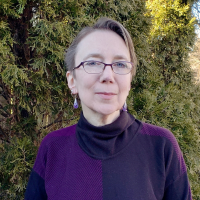iSchool researchers presented their work in game studies and design at the Playful by Design Conference, which was held on January 10 in Vila Nova de Gaia, Portugal. The conference included presentations on topics such as the gaming industry in Portugal and the U.S., games for learning, serious games, and emerging technologies.
Teaching Associate Professor Judith Pintar presented the keynote, "Playful by Design: The Illinois Model for Interdisciplinary Game Studies." In her talk, she discussed how the Game Studies and Design Program at Illinois emerged from the interdisciplinary Playful by Design community at UIUC.
"The development of the Game Studies and Design Program at the University of Illinois is a story about the possibilities that arise when we reject the notion that the Humanities, Arts, Social Sciences, and Science and Technologies fields should operate separately and in competition with each other," said Pintar. "A Playful by Design model derived from our experience may be helpful to other institutions interested in developing transformative and community-engaged academic programs in game studies and design on their campuses."
Other presentations included:
- "Biofeedback Technology: Games for Well-Being" by Teaching Assistant Professor David Hopping
- "Gameful Pedagogy: Towards a Students' Bill of Rights" by Informatics PhD student David A. Hopping and Pintar
- "Game Studies and Design Should Be Interdisciplinary: Why and How" by Director of Informatics Programs Lisa Bievenue
- "Emerging Technologies and the Impact on the Game Industry" by Game Studies Coordinator and Adjunct Lecturer Dan Cermak
- "Cognitive-Behavioral Game Design: Creating Serious Games for Serious Fun" and "Playing with Words: Growing Games from Books" by Postdoctoral Research Associate Katryna Starks
The conference was supported by the Instituto Politécnico de Gestão e Tecnologia; Universidade Lusófona; a grant from the European Union Center at the University of Illinois, entitled "Languages of Intercultural Practice Across the Atlantic;" and the Game Studies and Design Program at Illinois.


